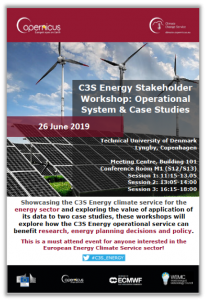PROGRAMME & SPEAKERS
ICEM 2019 Workshop: C3S Energy
Workshop Title: C3S Energy Stakeholder Workshop, Showcase & Case Studies
When: Wednesday 26th June 11:15-13:05; 13:05-14:00; 16:15-18:00 CEST
Where: DTU Lyngby Meeting Centre, Building 101, Conference Room M1 (S12/S13 13:05-14:00)
Conference pathway: Copernicus Climate Change Service (C3S) Energy 🌡
Session description:
Seasonal predictions and long-term projections of climate, along with uncertainty estimates, are now made possible thanks to remarkable progress in climate science. The accurate use of climate information is key to the energy sector as it needs to tackle issues related to climate variability and change for a robust planning of growing renewable energy, more diverse energy markets and management of changing climate risks. The workshop will evidence how C3S Energy operational service can benefit research, energy planning decisions and policy.
The aim of the case-studies workshop is to explore the practical value the Copernicus Climate Change Service (C3S) Energy Operational Service will deliver to the end users of the data. How do we bridge the gap between state of art climate capabilities and the industry end-users who need to make decisions? By working closely with industry partners and using a case study methodology our aim is to demonstrate how the users of the C3S data services can effectively extract value for their businesses. The workshop will illustrate the application of C3S data to two case studies.
Session leads:
Alberto Troccoli, Founding Director, WEMC
Caroline Acton, Senior Business Development Manager – Energy, Met Office
Schedule (click to expand):
Alberto Troccoli, WEMC
Alberto Troccoli, WEMC
This presentation describes how the EU Copernicus Climate Change Service (C3S) Energy Operational Service project is assisting with the energy transformation. C3S Energy, built on the extensive input and feedback from users received during the two C3S CLIM4ENERGY and European Climatic Energy Mixes services, is producing key climate and energy indicators three streams – historical, seasonal forecasts and projections – as well as developing two case studies. The indicators are based on the recent ERA5 reanalysis and state-of-the-art simplified energy conversion models and are available at 0.25° (as per ERA5) and/or at country (i.e. NUTS-0) and NUTS-2 levels, depending on the variable. Bias adjustment is applied to both seasonal forecasts and climate projections, the latter from 11 regional climate models of the EURO-CORDEX ensemble and 2 scenarios (RCP4.5 and RCP8.5). The products will be presented also through a web interface or demonstrator.
Laurent Dubus, WEMC/EDF
A brief overview of the energy models developed in C3S-Energy. Historical energy data from ENTSO-E have been extensively used to train the energy conversion models for demand, hydro (run-of-river and reservoir), wind (on- and off-shore) and solar (PV) power, for all three streams.
Sophie Martinoni-Lapierre, Météo-France
This presentation is a discussion on systems, output examples and skill assessment for a selection of Seasonal forecasts climate indicators and bias adjustment developed in this project. The data under review was collected with an ensemble, using several seasonal forecast models available on the CDS and the climate variables corrected by using a quantile mapping technique based on ERA5 reanalysis.
Robert Vautard / Flavio Pons, CEA
The presentation will briefly explain how climate projections are made for the forthcoming decades, and how they can be used for the energy sector. This includes future statistics of power generation as well as future weather conditions that can lead to risks for the energy sector, including extreme events.
Discussion about how the C3S Energy operational service can benefit research, energy planning decisions and policy.
The demonstrator is a state-of-the-art visualisation tool that shows the climate and energy variations across Europe. Climate data will include temperature, precipitation, solar radiation, wind speed and mean sea-level pressure. Demonstrator users will be provided with an extensive range of climate and energy information, including fact sheets, methods and assumptions, key messages, case studies and frequently asked questions.
Caroline Acton, Met Office
The workshop will include a short presentation from one of our industry partners with global expertise across the energy system to outline their interest in the project and their hopes for future developments. The session will close with an interactive discussion with the audience to optimise our approach and maximise the value of the case studies to the target users.
Xoserve is the central data provider for Britain’s gas market, responsible for energy balancing regulation. The Xoserve methodology relates weather to gas supply-demand through historical climate data. This session will elaborate on the importance of understanding the impacts of a changing climate in the energy industry in mitigating risks of under-supply and balancing costs in the long term.
Over the past few years, there has been a significant number of extreme meteorological events. This session will review the importance of seasonal climate forecasts as resources for a range of decision-making processes including the requirement to purchase weather insurance and the cost of this product for the energy sector. Understanding the likelihood of such events occurring for the season ahead can help assess how supply and demand will be impacted and whether the availability of more renewable energy sources would be able to offset energy prices.
A key aspect in raising the confidence of users in climate services is the demonstration of the value of the service via case studies. These have been co-designed by industrial and research partners to demonstrate the value of the C3S climate services for decision-making in the Energy sector over seasonal and longer timescales. The case studies developed in C3S Energy will illustrate the added value of energy variables derived from the C3S seasonal and climate data capability.
Feedback on the approach, the barriers to using climate data in industry context and what is required to trigger change based on the information provided.


